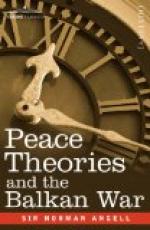(6) The fundamental causes of this war are economic in the narrower, as well as in the larger sense of the term; in the first because conquest was the Turk’s only trade—he desired to live out of taxes wrung from a conquered people, to exploit them as a means of livelihood, and this conception was at the bottom of most of Turkish misgovernment. And in the larger sense its cause is economic because in the Balkans, remote geographically from the main drift of European economic development, there has not grown up that interdependent social life, the innumerable contacts which in the rest of Europe have done so much to attenuate primitive religious and racial hatreds.
(7) A better understanding by the Turk of the real nature of civilised government, of the economic futility of conquest of the fact that a means of livelihood (an economic system), based upon having more force than someone else and using it ruthlessly against him, is an impossible form of human relationship bound to break down, would have kept the peace.
(8) If European statecraft had not been animated by false conceptions, largely economic in origin, based upon a belief in the necessary rivalry of states, the advantages of preponderant force and conquest, the Western nations could have composed their quarrels and ended the abominations of the Balkan peninsula long ago—even in the opinion of the Times. And it is our own false statecraft—that of Great Britain—which has a large part of the responsibility for this failure of European civilisation. It has caused us to sustain the Turk in Europe, to fight a great and popular war with that aim, and led us into treaties which had they been kept, would have obliged us to fight to-day on the side of the Turk against the Balkan States.
(9) If by “theories” and “logic” is meant the discussion of and interest in principles, the ideas that govern human relationship, they are the only things that can prevent future wars, just as they were the only things that brought religious wars to an end—a preponderant power “imposing” peace playing no role therein. Just as it was false religious theories which made the religious wars, so it is false political theories which make the political wars.
(10) War is only inevitable in the sense that other forms of error and passion—religious persecution for instance—are inevitable; they cease with better understanding, as the attempt to impose religious belief by force has ceased in Europe.
(11) We should not prepare for war; we should prepare to prevent war; and though that preparation may include battleships and conscription, those elements will quite obviously make the tension and danger greater unless there is also a better European opinion.
These summarised replies need a little expansion.
CHAPTER II.
“PEACE” AND “WAR” IN THE BALKANS.




